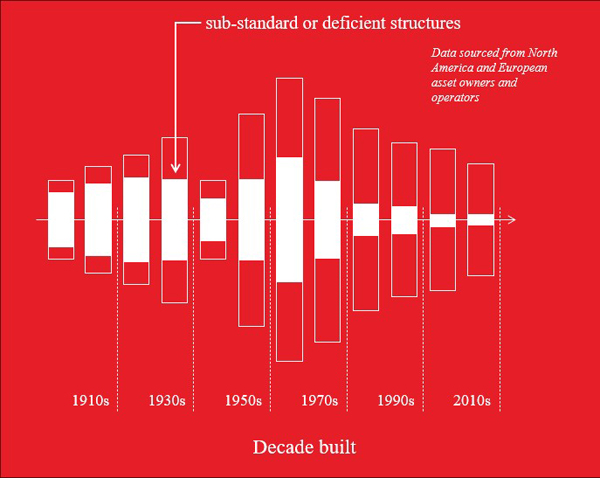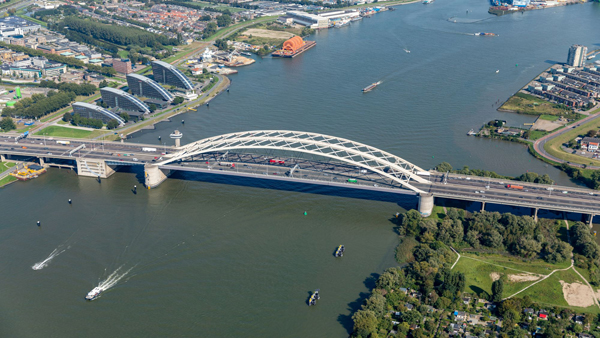Alistair Hunter, highways leader UKIMEA at Arup, discusses the complex issue of upgrading ageing assets and how this challenge must be used to build a more sustainable future.

The impact of the UK’s ageing infrastructure is becoming increasingly apparent. Each week, our rail and road networks experience increased numbers of unplanned closures, often linked to emerging structural defects or climate change events.
The disruption to individuals, businesses and the wider economy is set to increase unless we redirect our attention to maintenance and operations. It is a key challenge for the whole industry to make this an attractive case against a host of competing public expenditure proposals.
In the UK, our strategic road network was largely constructed between 1960 and 1980 and so is a lot newer than some of our rail infrastructure – some of our railway assets are now over 200 years old, and abound with ageing masonry structures and viaducts. However, the highway and structural design standards in the 1960s had little redundancy and often used heavily pre-stressed concrete solutions, which are known in places to have used sub-standard construction methods and materials.
Simply put, it is becoming increasingly apparent that our highways may not age as well as our rail network, and the time to embed solutions is now, such as the welcome Concrete Roads programme from National Highways.
The need for accelerated actions adds to what has become a truly sticky problem. We need to replace our transport assets cost-effectively, prioritise saving carbon through the embedding of a circular economy, and minimise disruption to the customer – at pace.
Sourced from data from asset owners from North America and Europe, the figure below highlights the amount of older highways structural stock requiring upgrade and renewal.

As planners and engineers will attest, this is a far greater challenge than building a nice new shiny asset from scratch. This means we must be innovative and collaborative with our thinking and delivery across the sector.
What have we learned already globally?
At Arup, we have identified four key areas that are applicable globally.
Resilient financial planning – Asset owners are often faced with unplanned and emergency closures that eat into annual budgets, as well as impacting staff and resources. To be best prepared for the unknown, planning portfolios must build in resilience at a national level. Reasonable predictions can be made at the network level, based on experience and overall network condition to deal with emergency defects. With that in mind, contingency budgets can be held at suitable levels to support and mobilise renewal planning.
Appropriate procurement and risk – The condition of an old complex asset (or portfolio of assets) requires sufficient investigation and thought. A considered approach to driving out risk is by undertaking appropriate levels of investigation. Outlining design and thinking of buildability prior to going to market, ensures contractors, designers and the complex web of project stakeholders are not deterred by the risk profile.
Innovation is key – Complex asset renewals require a new level of thinking. Considering the engineering challenges in the context of minimising cost, carbon and customer disruption needs careful contextual planning. Innovative solutions – often involving reusing or repurposing the existing asset – is a very different proposition from designing and constructing from new on a green field site. If imaginatively and carefully undertaken, this thinking can result in a hugely optimised programme of works with beneficial outcomes for the customer, client and environment.
Sustainable construction – To maximise sustainability, measures need to be implemented throughout renewal schemes, and consideration needs to be taken across the project lifecycle. This means prioritising the reuse of materials and incorporating low carbon solutions, as well as accounting for how the assets will be used for years to come. Funding and customer disruption continue to be pressures in this area; asset operators need to keep their networks operational. Striking the right balance between these crucial factors is challenging and dependent on the assets themselves - but very possible.
A contemporary example is the renovation of Van Brienenoord Bridge in the Netherlands (below).

As the busiest bridge in the country, Arup’s involvement has enabled this major renewal to illustrate how circularity and minimal user disruption can both be put into practice. This will involve the bridge’s Western arch being removed and floated down the canal on barges to be refurbished and then used to replace the older Eastern arch, reusing around 3,000 tonnes of steel. The plans will reduce the bridge’s entire closure from an expected 1.5 years to just six weeks, with huge benefits to the travelling public.
Looking forward
No one asset owner or operator, nor one industry or country, has all the answers to the questions around optimising carbon, the customer, or cost. As actors across industries and sectors with unique but complementary expertise, we have to rise to the very real financial, political, environmental and technical challenges of effectively maintaining and renewing ageing assets. We must continue to learn from each other to deliver the solutions that are needed at scale and pace.





